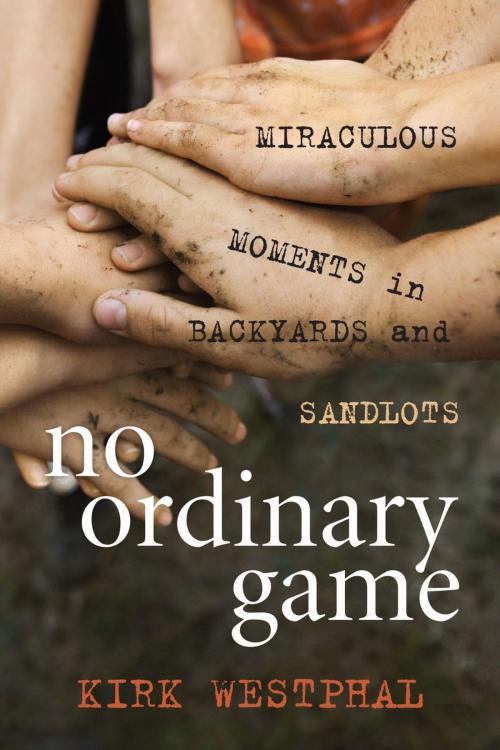No Ordinary Game
Miraculous Moments in Backyards and Sandlots
Nonfiction, Sports, Reference, Religion & Spirituality, New Age, Personal Transformation| Author: | Kirk Westphal | ISBN: | 9781608933648 |
| Publisher: | Down East Books | Publication: | June 1, 2015 |
| Imprint: | Down East Books | Language: | English |
| Author: | Kirk Westphal |
| ISBN: | 9781608933648 |
| Publisher: | Down East Books |
| Publication: | June 1, 2015 |
| Imprint: | Down East Books |
| Language: | English |
A young boy nearly paralyzed in a car accident runs for the first time in his life during a baseball game. A refugee family from despoiled East Africa plays soccer in my suburban backyard on Thanksgiving Day. A group of college boys is challenged to a game of basketball against the women’s varsity team in an empty gym, then another on a tough inner city court. I hit the first homerun of my life when I am thirty-three years old. These are Ordinary Games.
This is a book of pure inspiration. Many of the sporting world’s most profound achievements and displays of humanity are never recorded. They happen on sandlots, asphalt, and backyards. Stories of well-known athletes and teams abound in popular literature – what is missing is an exaltation of the moments that can happen to any of the rest of us - and do**. Ordinary Games** is the grandstand for everyday miracles.
This is an inspirational book that shows how any one of us can transcend possibility or lighten life’s burdens simply by picking up a ball. It is a collection of poignant memoirs of games played without grandstands. Some of the stories relive everyday miracles, while others find the souls of players ascending into the spirits of the games they play. They tell of the glory, despair, and humanity that can be found any afternoon or evening, at any playground, gym, or empty field.
The tone is frequently humorous, but the tenor is deeply and genuinely human. While the primary themes involve overcoming impossible odds, secondary themes focus on overcoming common misperceptions. Throughout the narrative, these pieces explore racial and gender divides (including a history of violent separatism) with subtlety, grace, realization, respect, and the common language of competition. The vantage point is wholly familiar, yet new and fresh. My voice is that of a mediocre athlete who can hold his own (but to save his life cannot run fast), and whose sensibilities ignite when the game is on. This familiarity and intensity let readers watch and play at the same time, and hardly notice the difference. Something in each chapter has happened to them, too, and is worth remembering.
A young boy nearly paralyzed in a car accident runs for the first time in his life during a baseball game. A refugee family from despoiled East Africa plays soccer in my suburban backyard on Thanksgiving Day. A group of college boys is challenged to a game of basketball against the women’s varsity team in an empty gym, then another on a tough inner city court. I hit the first homerun of my life when I am thirty-three years old. These are Ordinary Games.
This is a book of pure inspiration. Many of the sporting world’s most profound achievements and displays of humanity are never recorded. They happen on sandlots, asphalt, and backyards. Stories of well-known athletes and teams abound in popular literature – what is missing is an exaltation of the moments that can happen to any of the rest of us - and do**. Ordinary Games** is the grandstand for everyday miracles.
This is an inspirational book that shows how any one of us can transcend possibility or lighten life’s burdens simply by picking up a ball. It is a collection of poignant memoirs of games played without grandstands. Some of the stories relive everyday miracles, while others find the souls of players ascending into the spirits of the games they play. They tell of the glory, despair, and humanity that can be found any afternoon or evening, at any playground, gym, or empty field.
The tone is frequently humorous, but the tenor is deeply and genuinely human. While the primary themes involve overcoming impossible odds, secondary themes focus on overcoming common misperceptions. Throughout the narrative, these pieces explore racial and gender divides (including a history of violent separatism) with subtlety, grace, realization, respect, and the common language of competition. The vantage point is wholly familiar, yet new and fresh. My voice is that of a mediocre athlete who can hold his own (but to save his life cannot run fast), and whose sensibilities ignite when the game is on. This familiarity and intensity let readers watch and play at the same time, and hardly notice the difference. Something in each chapter has happened to them, too, and is worth remembering.















